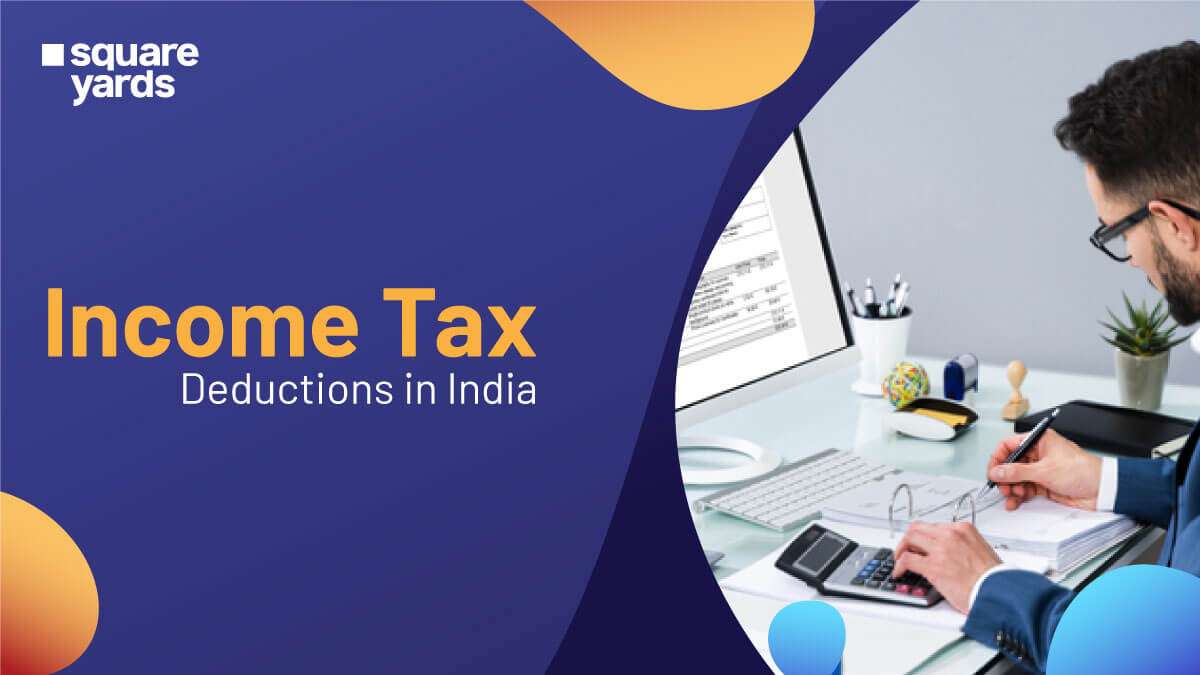Any citizen or registered taxpayer in this country can have multiple sources of income. However, all of the income that a person receives in the country is liable to income tax above a certain limit. The Income Tax Act of 1961 states that all the income that a person earns in a financial year is liable to be taxed at the applicable tax slab.
However, there are a number of options that you can take advantage of to reduce your tax liability. Using the right tax-saving instruments can help you save huge amounts of money. Some of these tax-saving instruments are mentioned in Section 80C and Section 80D of the Income Tax Act.
In this blog, we will take a look at some of the income tax deductions that are applicable in India and how you can use them.
Table of contents
- What are Income Tax Deductions in India?
- Benefits of Tax Deductions?
- Various Types of Tax Deductions in India
- Public Provident Fund (PPS)
- Employees’ Provident Fund (EPF)
- Equity-linked Savings Scheme
- Senior Citizen’s Savings Scheme
- National Pension Scheme (NPS)
- Unit-Linked Insurance Plans and Endowment Plans (ULIP)
- Term Deposits
- Infrastructure Bonds
- Medical Insurance
- Medical Expenses
- Medical Treatment of Disabled Persons
- Loan Interest
- Donations to Charity
- Contributions to Political Parties
- Rental Allowance
- Disability Exemption
- Stock Market Investment
- Losses Incurred in Stocks
- Family Finances
- Leave Travel Allowance
- Tax on Bonus
- Interest on Home Loan
- Deduction on Savings Account Interest
- Frequently Asked Questions (FAQ’s)
What are Income Tax Deductions in India?
Income tax deductions refer to any applicable claims that you can apply to your tax liability to reduce the taxing burden. These may be due to various investment decisions and expenses borne by the taxpayer. However, the amount of your tax deductions depends upon the type of tax-saving instrument you use.
Benefits of Tax Deductions?
Given below are some of the benefits associated with tax deductions in India:
- Tax deduction enables you to lower your tax liability by reducing the amount you owe to the government.
- Reduced tax liability means that the taxpayer can save money and invest the same in other areas.
- Tax deductions lower the income that may be subject to a higher taxation slab. They can be claimed for amounts spent on charitable contributions, medical expenses, and tuition fees.
Various Types of Tax Deductions in India
As discussed before, the different kinds of tax-saving instruments are detailed in Sections 80C and 80D of the Income Tax Act. Some of the most commonly used tax deduction options are government schemes and insurance plans. However, the benefits offered by each scheme differ greatly. Given below are some of the tax-saving options that you can use to reduce your liability:
Public Provident Fund (PPS)
One of the most widely used investment schemes, according to Section 80C of the Income Tax Act, is the Public Provident Fund. The taxpayer is allowed to make an investment of up to Rs. 1.5 lakh in this scheme, and the entire amount will be exempt from their income tax.
Further, any interest accrued from this scheme will not be taxed under the Income Tax Act. Any Indian citizen who has a PPF account can take advantage of this scheme by opening a fund in any of the post offices, private banks, or State Bank of India branches in the country. This scheme currently offers an interest return of 7.8% per annum.
Employees’ Provident Fund (EPF)
A growing number of organisations and companies in India permit their employees to apply for an EPF scheme, as the amount invested in the same is eligible for a tax deduction. Further, the returns earned from any such scheme are also not liable to be taxed.
However, taxpayers who opt for an EPF scheme will be required to contribute 12% of their basic salary towards this scheme, while the employer is also required to match their contribution. The maximum deduction that can be claimed under this scheme is capped at Rs. 1.5 lakhs.
Equity-linked Savings Scheme
Equity-linked Savings Schemes have become very popular as a tax saving instrument due to their enhanced performance in the stock market. However, the mutual fund market has been experiencing a low and ELSS has taken the majority of the brunt. Even though ELSS is not very susceptible to risk, they have the ability to provide significantly high returns.
Senior Citizen’s Savings Scheme
Senior citizens over the age of 60 years can get regular returns if they invest in a Senior Citizen’s Savings Scheme. Even though it has a five year lock-in period and provides a yearly return of 8.4%, the subscriber has the option to withdraw the deposit amount after the first year by just paying the penalty. However, any returns offered by this scheme are subject to income tax. In case the tax liability exceeds Rs. 5,000, it will be deducted in the form of TDS.
National Pension Scheme (NPS)
People who choose to opt for the National Pension Scheme (NPS) will first have to ensure that they have registered their company under the programme. Investing in this pension programme can effectively lower your tax liability by up to 10% in accordance with Section 80CCD(2) of the Income Tax Act. The individual is required to make a minimum annual contribution of Rs. 6,000 under this scheme, and it offers market-linked returns. This makes it more than just a savings scheme.
Functioning more like a retirement account, the National Pension Scheme helps in building a strong portfolio for retirement. However, it is important to know that the individual can only withdraw 60% of the amount while the rest is paid out in instalments in the form of pension annuity. The reason why this scheme has become so popular is that it has lower fees and charges as compared to other schemes.
Unit-Linked Insurance Plans and Endowment Plans (ULIP)
Even though endowment plans and unit-linked plans are two different programs, they both have an insurance component. Both these highly flexible schemes are offered by insurance agencies all over the country.
These instruments provide comparatively higher returns but have recently gained popularity owing to their tax-saving benefits. In addition to their returns, it is highly beneficial to invest in PPFs in term insurance plans in place of an endowment plan.
Term Deposits
The interest earned through term deposits is liable to be taxed under the Income Tax Act. They are considered to be a less profitable form of investment as compared to PPF schemes. However, term deposits offer a higher rate of return than PPF plans. These investment products can be obtained from banks/post offices and generally come with a 5-year lock-in period.
Infrastructure Bonds
A number of organisations in the infrastructure sector issue bond options to their employees at the end of every year. Some of the best bond investment options are in the PTC India Financial Services, Rural Electrification Corporation, Finance Corporation of India, and SREI Infrastructure Finance and L&T Infrastructure. By investing in these bonds, you could claim a tax deduction of up to Rs. 20,000 in accordance with Section 80CCF of the Income Tax Act. These bonds generally offer an interest rate of 8.7%.
Medical Insurance
Taxpayers can claim tax deductions of up to Rs. 35,000 in the form of medical insurance in accordance with Section 80D of the Income Tax Act. The applicant is required to make a maximum premium payment of around Rs. 15,000 to be eligible. Further, if an individual is making these premium payments for their parents, they can claim an additional deduction of Rs. 20,000. The deduction limit is capped at Rs. 15,000 if the parents are below 60 years of age.
Medical Expenses
If the individual has incurred expenses for their or their dependent’s medical treatment, they can claim tax deductions of up to Rs. 40,000. If the amount you have spent is less than Rs. 40,000, the individual is eligible for full reimbursement as stated under Section 80DDB of the Income Tax Act. In case you have incurred medical expenses for the treatment of a senior citizen, you can claim a deduction of up to Rs. 60,000.
Medical Treatment of Disabled Persons
According to Section 80DD of the Income Tax Act, tax deductions can be made with respect to medical costs incurred for the treatment of disabled persons. This is applicable if the premium payments are being made through LIC or any other insurance provider that has been approved by the Income Tax Department.
The definition of dependent, in this regard, is limited to immediate relatives, like children, siblings, parents or spouses. If the person in question is deemed to be 40% disabled, a claim of Rs. 50,000 per year can be availed. Further, if the dependent is 80% disabled, the tax deductions are limited to Rs. 1 lakh per year.
Loan Interest
If the individual has availed of an education loan for higher studies or the studies of their dependents, the interest payments associated with the loans are exempt from taxation. These loans can be obtained for the individual’s children, wife, or other minors to whom they are legal guardians.
The tax deduction on such loans can be claimed for a period of 8 years or till the date you have made interest payments, whichever is earlier. However, these tax deductions are only applicable for loans that have been availed for higher education purposes, such as graduate and post-graduate courses.
Donations to Charity
Any donations or charitable contributions made to institutions and trusts can be used to claim deductions as stated under Section 80G of the Income Tax Act. Claims can be made for 50% or 100% of the amount, depending upon the type of donation.
Certain donations made to organisations, like the Prime Minister’s National Relief Fund, National Foundation for Communal Harmony, Prime Minister’s Drought Relief Fund, etc., are eligible for tax deductions.
Contributions to Political Parties
If the individual has made any contributions to a political party or electoral trusts, they can claim tax deductions in accordance with Section 80GGC of the Income Tax Act.
Rental Allowance
In case the taxpayer is living in a rented residential property and does not receive any kind of provision for House Rent Allowance, they can claim deductions as stated under Section 80GG of the Income Tax Act.
However, the taxpayer is not eligible to claim these deductions if their children or spouse are living in a rented accommodation overseas. In such cases, the limit of the tax deduction is capped at 25% of total income extra rent paid in addition to 10% of the overall income, or Rs. 2,000 per month.
Disability Exemption
Any Indian taxpayer who is ailing from any disability is eligible to claim tax deductions as stated under Section 80U of the Income Tax Act. To be eligible for this provision, the person has to be over 40% disabled with blindness, mental retardation, mental illness, hearing impairment, or low vision. The maximum amount of deduction that can be claimed in this regard is capped at Rs. 50,000. In case it is a more severe disability, an amount of up to Rs. 1 lakh can be claimed.
Stock Market Investment
Section 80CCG of the IT Act was incorporated with the Finance Act of 2012 to introduce a 50% tax relief for new investors who have invested up to Rs. 50,000 in the share market. However, the person should have a taxable income of less than Rs. 10 lakh per annum.
Losses Incurred in Stocks
Any losses incurred by the taxpayer as a result of dealings in the stock market can be set off against the due tax amount to reduce the tax liability. If the taxpayer has sold any property, gold, or debt funds and made any profits, they can be set off against short-term capital losses, which is extremely helpful in lowering the tax liability.
Family Finances
In case the taxpayer has made an investment in their children’s name, the income earned from such investments is pooled together with the income of the parent, which is a higher tax bracket.
Income tax deduction claims can be made for a maximum of 2 children, up to a limit of Rs. 1500 per child. If the taxpayer has opened an FD account in their children’s name, the interest earned from the same will not be clubbed with the parent’s income.
If you reside in your parent’s house, you can make rent payments to them. If the parent’s income falls in a lower tax slab or earns no taxable income, the total tax liability can be reduced greatly. However, the rent received by the parents will be taxed at a rate of 30%.
This means that if the parents are senior citizens, they can receive up to Rs. 3.57 lakhs in a year with no extra tax liability. In case the parents are over 80 years of age, they can receive up to Rs. 7.15 lakhs without the added tax burden.
Leave Travel Allowance
Leave travel allowance is a component of an employee’s salary that can be used to compensate for any expenses incurred during travel on vacations. This allowance is paid out to the employee every two years. If the employee has not claimed their LTA for a four year period, one trip can be carried forward to the next four year period and can be availed in the first year of the next block.
Tax on Bonus
Any bonuses that an employer pays to his employees are taxable in the financial year they are received. But, because tax rates are variable, if the employee requests the employer to pay the bonuses in the next year, they can save a huge amount of money on their income tax payments. Please note that you will have to submit your investment information to the employer to ensure that they do not deduct the tax on the bonus before it has actually been paid out.
Interest on Home Loan
Section 80EE of the Income Tax Act states that homeowners are eligible to claim an extra deduction of Rs. 50,000 with respect to the interest component of their home loan EMI payments.
This provision is subject to the below-given conditions:
- The total loan value should not be more than Rs. 35,00,000.
- The market value of the concerned property should not exceed Rs. 50,00,000.
- The taxpayer should not have any other property registered under their name while availing of the loan.
Deduction on Savings Account Interest
Section 80TTA of the Income Tax Act makes provision for tax deductions up to a limit of Rs. 10,000 on any interest earned from a savings account. If the interest amount earned from the savings account is less than Rs. 10,000, the entire amount will be eligible for deduction. However, any amount exceeding Rs. 10,000 will be eligible for taxation.
You May Also Read:
Frequently Asked Questions (FAQ’s)
What are the deductions available for gifts or vouchers provided by the employer?
Any vouchers or gifts provided to an employee by their employer are tax-exempt up to a limit of Rs. 5,000.
What are the deductions available for health club facilities provided by the employer?
If the health club facility is being provided uniformly to all the employees, the provision is not taxable as per the Income Tax Act.













































